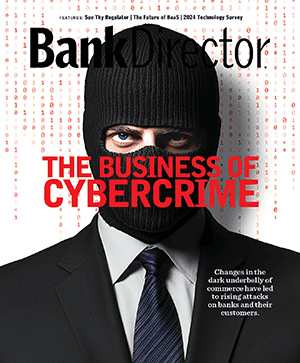
How Much is Too Much?
One perplexing aspect of board minutes is the level of detail that is required. Regulators seem to want more detail in board meeting minutes that show a thorough discussion took place on important matters, and that board members are engaged and exercising good corporate governance. On the other hand, minutes can also provide fodder for shareholder lawsuits and regulatory action. So how much detail is enough? Bank Director asked a panel of attorneys that question.
How complete should board minutes be, and should they ever be audio recorded and saved?
 Board minutes should be detailed enough to indicate the matters addressed and determinations reached. Objections by individuals to the group decision should also be noted. Meetings should never be recorded, nor should minutes be the equivalent of a transcript. Bankers who are tempted to have minutes that are so comprehensive that they imply that nothing else was covered if it were not in the minutes might go ahead and start kicking themselves rather than wait for the plaintiff lawyers to do so later.
Board minutes should be detailed enough to indicate the matters addressed and determinations reached. Objections by individuals to the group decision should also be noted. Meetings should never be recorded, nor should minutes be the equivalent of a transcript. Bankers who are tempted to have minutes that are so comprehensive that they imply that nothing else was covered if it were not in the minutes might go ahead and start kicking themselves rather than wait for the plaintiff lawyers to do so later.
—Peter Weinstock, Hunton & Williams LLP
 Recent years have shown that board minutes are more than just a record in the corporate minute book; they may become evidence in lawsuits or regulatory enforcement actions. It is essential that board minutes accurately reflect the proceedings, and they should be reviewed and approved by the full board at the following meeting. However, individual notes generally should be excluded from board minutes, and drafts should be discarded. As a general rule, meetings generally should not be recorded so that board members do not feel inhibited or constrained from engaging in frank discussion about sensitive corporate governance matters. In the end, the written minutes should be the definitive record of the meeting.
Recent years have shown that board minutes are more than just a record in the corporate minute book; they may become evidence in lawsuits or regulatory enforcement actions. It is essential that board minutes accurately reflect the proceedings, and they should be reviewed and approved by the full board at the following meeting. However, individual notes generally should be excluded from board minutes, and drafts should be discarded. As a general rule, meetings generally should not be recorded so that board members do not feel inhibited or constrained from engaging in frank discussion about sensitive corporate governance matters. In the end, the written minutes should be the definitive record of the meeting.
—Jonathan Wegner, Baird Holm LLP
 There is no perfect formula for board minutes. They should be complete enough that they fully memorialize the actions of the board. For routine matters, they may be fairly brief, but for extraordinary matters, they should be more thorough and possibly detail discussions with experts and/or financial analyses. I would advise against audio recording board meetings. The minutes should be the only retained record to eliminate discrepancies or inconsistencies. This also goes for directors’ notes which should not be retained following a meeting. A seasoned litigator once told me that if there is a legal issue, every page of notes taken by a director and retained after a meeting equaled one hour of deposition time for that director.
There is no perfect formula for board minutes. They should be complete enough that they fully memorialize the actions of the board. For routine matters, they may be fairly brief, but for extraordinary matters, they should be more thorough and possibly detail discussions with experts and/or financial analyses. I would advise against audio recording board meetings. The minutes should be the only retained record to eliminate discrepancies or inconsistencies. This also goes for directors’ notes which should not be retained following a meeting. A seasoned litigator once told me that if there is a legal issue, every page of notes taken by a director and retained after a meeting equaled one hour of deposition time for that director.
—Susan Zaunbrecher, Dinsmore & Shohl LLP
 Audio recording of board minutes is antithetical to their purpose, which is to record the business transacted and accomplished at the meeting and substantiate that proper procedure was followed (i.e., notice, quorum, etc.) and not be a transcript of conversations. Perhaps most importantly, minutes are legal documents that are generally discoverable in a lawsuit no matter in what form they are maintained. Institutions need to consider whether they would want to have their audio recorded minutes played in a court room for all to hear.
Audio recording of board minutes is antithetical to their purpose, which is to record the business transacted and accomplished at the meeting and substantiate that proper procedure was followed (i.e., notice, quorum, etc.) and not be a transcript of conversations. Perhaps most importantly, minutes are legal documents that are generally discoverable in a lawsuit no matter in what form they are maintained. Institutions need to consider whether they would want to have their audio recorded minutes played in a court room for all to hear.
—Victor Cangelosi, Kilpatrick Townsend & Stockton LLP
 Maintaining needlessly detailed minutes is a horridly unsophisticated practice. In the context of banks and bank holding companies, board and committee minutes should be purposeful and set forth the essentials. The minutes of meetings are not intended to, nor should they, be transcripts. The proceedings at a meeting have legal significance to an organization and its directors if votes are required for action or nuanced consideration of board-required actions must be demonstrated. Recording and saving the recordings is inadvisable. On rare and sensitive occasions, recording the meeting to assist the note taker prepare the minutes might be warranted, but the recordings never should be saved. In my experience, recording meetings also discourages useful give and take. To the extent that activity in a board meeting becomes legally relevant, litigators protecting an organization would prefer a boiled down written record and prepare witnesses based upon it.
Maintaining needlessly detailed minutes is a horridly unsophisticated practice. In the context of banks and bank holding companies, board and committee minutes should be purposeful and set forth the essentials. The minutes of meetings are not intended to, nor should they, be transcripts. The proceedings at a meeting have legal significance to an organization and its directors if votes are required for action or nuanced consideration of board-required actions must be demonstrated. Recording and saving the recordings is inadvisable. On rare and sensitive occasions, recording the meeting to assist the note taker prepare the minutes might be warranted, but the recordings never should be saved. In my experience, recording meetings also discourages useful give and take. To the extent that activity in a board meeting becomes legally relevant, litigators protecting an organization would prefer a boiled down written record and prepare witnesses based upon it.
—Mark Nuccio, Ropes & Gray LLP
 We generally recommend that, particularly for community bank holding companies, the board try and maintain only a very general summary of discussion points. The primary exception to this general principle is that where a board is making a significant shift in policy or taking a strategic action with a relatively high degree of risk, we recommend taking care to include information sufficient to demonstrate that the board has satisfied its fiduciary duties—but even in those cases, erring toward the side of omitting unnecessary detail. Examples of these situations commonly include the consideration and approval of M&A and capital markets transactions, but increasingly we have also included more thorough summaries of factors that support adoption of or changes in dividend policies, branch expansions and similar decisions.
We generally recommend that, particularly for community bank holding companies, the board try and maintain only a very general summary of discussion points. The primary exception to this general principle is that where a board is making a significant shift in policy or taking a strategic action with a relatively high degree of risk, we recommend taking care to include information sufficient to demonstrate that the board has satisfied its fiduciary duties—but even in those cases, erring toward the side of omitting unnecessary detail. Examples of these situations commonly include the consideration and approval of M&A and capital markets transactions, but increasingly we have also included more thorough summaries of factors that support adoption of or changes in dividend policies, branch expansions and similar decisions.
—Marc Williams, Davis Wright Tremaine LLP

